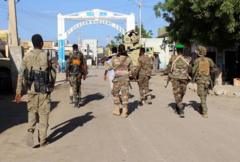Iran's Foreign Minister Abbas Araghchi stated that the country is prepared to discuss its nuclear program in negotiations, conditioned on the U.S. ceasing military threats. The upcoming meetings aim to address long-standing tensions, but both sides have differing views on the format and outcomes.
Iran Ready for Nuclear Negotiations if U.S. Abandons Military Threats

Iran Ready for Nuclear Negotiations if U.S. Abandons Military Threats
Iran expresses willingness to engage in nuclear talks, demanding U.S. halt threats.
Iran’s Foreign Minister Abbas Araghchi announced the nation’s readiness to participate in nuclear negotiations with the United States, contingent upon the U.S. renouncing any military threats. The event, scheduled for Saturday in Oman, marks a crucial opportunity to potentially finalize a new agreement on Iran’s nuclear activities, with Araghchi emphasizing that coercion will not be tolerated.
Despite U.S. President Donald Trump's recent assertion of direct talks, Araghchi stressed that the discussions would remain indirect, highlighting the complexities of U.S.-Iran relations. The absence of diplomatic ties adds to the difficulties, necessitating the intermediaries like the United Arab Emirates for communications. Trump has previously warned of severe consequences for Iran should negotiations fail, with both he and Israeli Prime Minister Benjamin Netanyahu advocating for an approach that guarantees Iran does not obtain nuclear weapons.
Iran maintains that its nuclear program is exclusively peaceful, countering claims of weaponization and expressing readiness to clarify any concerns about its intentions. In light of the reinstated sanctions from the U.S., Iran has progressively violated elements of the previous nuclear agreement established in 2015, which curbed its nuclear development in exchange for economic relief. The ongoing tensions have resulted in Iran accumulating enough highly enriched uranium to potentially yield nuclear weapons.
The participants in the Oman talks are expected to delve into the specifics of the nuclear program, with U.S. plans reportedly calling for the complete dismantling of Iran’s nuclear capabilities, a non-negotiable standpoint for Tehran. A senior Iranian official reaffirmed their nation's commitment to never dismantle its nuclear program, explicitly ruling out models previously adopted by Libya.
Araghchi encapsulated the current diplomatic mood by stating, “The ball is now in America’s court," urging a potential shift toward a mutually beneficial agreement if respect and sincerity are demonstrated by the U.S. Moving forward, these negotiations hold critical implications not only for Iran and the U.S. but also for regional stability amidst heightened global scrutiny.





















